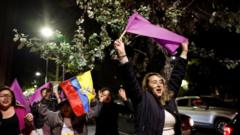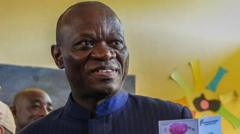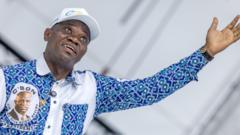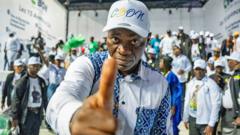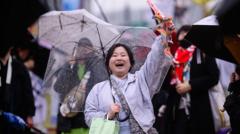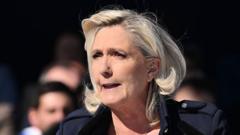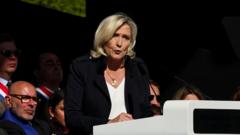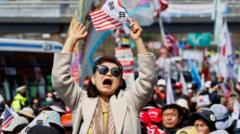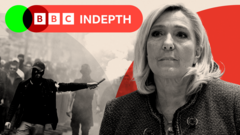Gen. Brice Oligui Nguema has won a landslide victory in Gabon’s presidential election with over 90% of the vote, solidifying his authority after staging a coup in 2023. The former military officer’s main rival, Alain Claude Bilie-By-Nze, conceded, while observers raised concerns about the fairness of the election. Nguema's win reflects a troubling trend in West and Central Africa, where military leaders are increasingly returning to political power.
Gabon’s Military Leader Secures Presidential Victory Following Coup

Gabon’s Military Leader Secures Presidential Victory Following Coup
Gen. Brice Oligui Nguema wins Gabon's presidential election, reinforcing military rule in the oil-rich nation after a 2023 coup.
Gen. Brice Oligui Nguema celebrated his victory at his campaign headquarters in Libreville, Gabon, marking a significant moment for the country's political landscape. The Interior Ministry announced his decisive win with more than 90% of the votes cast. Meanwhile, Alain Claude Bilie-By-Nze, the former prime minister and main contender, acknowledged his defeat, paving the way for Nguema's continued leadership.
Gabon’s Constitutional Court is expected to confirm the official results shortly, though many political analysts have suggested that the election process may have been skewed to ensure General Nguema's success. His presidency is set for the next seven years, aligning him with a concerning pattern in the region where recent years have seen military coups followed by elections that favor the leaders who seized power.
Similar trends are observed in other Central African nations such as Chad, where militant leaders have transitioned to elections following military takeovers. The election results raise questions regarding democratic processes and the retention of military influence in politics across West and Central Africa, reflecting a complex interplay of governance, power, and public trust.
Gabon’s Constitutional Court is expected to confirm the official results shortly, though many political analysts have suggested that the election process may have been skewed to ensure General Nguema's success. His presidency is set for the next seven years, aligning him with a concerning pattern in the region where recent years have seen military coups followed by elections that favor the leaders who seized power.
Similar trends are observed in other Central African nations such as Chad, where militant leaders have transitioned to elections following military takeovers. The election results raise questions regarding democratic processes and the retention of military influence in politics across West and Central Africa, reflecting a complex interplay of governance, power, and public trust.


